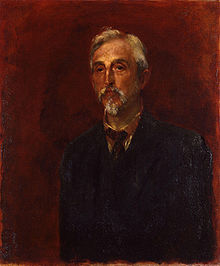Charles Booth

Charles Booth (born March 30, 1840 in Liverpool , † November 23, 1916 in Thringstone , Leicestershire ) was a British philanthropist and social researcher, known for his documentation of the living conditions of the working class in London at the end of the 19th century. Alongside Henry Mayhew, Booth is one of the pioneers in urban research .
Life
Booth was the second oldest child of wealthy Liverpool grain merchant Charles Booth Sr. The family was politically liberal and of the Unitarian faith . Charles' mother died when he was 13, his father when he was 20, and at 22 he lost the woman he was going to marry. He attended the Royal Institution School in Liverpool and after graduating in 1856 did a four-year internship with the Lampson & Holt shipping company , which he got through family contacts. He later opened a company himself with his brother (the Booth Steamship Company ), which mainly traded in hides and leather. To this end, he set up the company's New York branch. In 1864 he returned to Liverpool and took an active part in the design and construction of two new steamers, one of which he accompanied on its maiden voyage to South America.
Booth also pursued political projects such as organizing labor movements, creating a universal, secular school education or running a parliamentary candidacy. Among other things, since all of these ambitions were failures, he got into a strong personal crisis and alienated himself from his previous environment. In 1871 he married Mary Macauley, who, after further collapses, accompanied him on a vacation trip to the continent in 1873 . Following this, the company moved to London in 1875, and after successfully rescuing a share company in America, Booth had recovered completely and suffered no further collapse. In London he often met socialists who were friends, called “symposiums”. The Royal Statistical Society joined Booth in 1885 and became its president in 1892 even.
Life and Labor of the People in London
Charles Booth is famous for his work on poverty in London. The reason for this study was a dispute with the founder of two socialist parties in England, Henry Mayer's Hyndman . He had claimed that a quarter of all Londoners lived in poverty and Booth wanted to refute this. He analyzed the 1881 census and compared it with that of 1801, visited London's East End frequently, and finally started his own survey.
All persons were asked about employment, income and family size, among other things. On this data, Booth made a classification that ranged from the lowest class A to class H - the upper middle class - and everything above. He also made detailed cards in which the classes were illustrated in color from dark (poor) to light (wealthy). In 1893 he made a reclassification based on a combined ranking system from z. B. poverty, population density, age at marriage, birth and death rates was determined. The study Life and Labor of the People in London comprises 17 volumes and can be subdivided into the three categories of poverty, industry and religion. Booth always used the results he had acquired so far to find the research goal for the next work. In the end, he came to the conclusion that even over 30% of Londoners lived in poverty, and thought about how this could be remedied.
Political opinions
One of the main findings of his study was the problem of old-age poverty. Although he was a conservative person who emphasized individualism throughout his life , he was strongly committed to state pensions, which earned him the appointment to the Royal Commission on the Aged Poor . Despite his contact and friendship with British socialists, he strictly rejected the idea of socialism, and the older he got, the clearer it became. His perspective on the people he placed in class A is also remarkable. Quoted in Lindner, he writes that “they do not render any useful service, do not create any wealth, rather they destroy it. Whatever they touch, they spoil ”( Walks On The Wild Side ). He assumes that they cannot improve and starts all auxiliary considerations only with class B. Class A districts were marked in black on the cards and assigned to casual workers, bums and semi-criminals.
Honors
Because of its benefits Booth should be knighted, but you did previously learned that he held the position of the secret Council a knighthood would prefer. In 1904 he received an honorary doctorate from Oxford and there is the Charles Booth Lectureship at the University of Liverpool . In St Paul's Cathedral , a plaque commemorates him and Toynbee Hall has a grand piano, the one after the renovation in Charles Booth House has been renamed. In addition, after the Liberal Party entered government in 1906 , his state pension efforts were still being put into practice.
literature
- Rolf Lindner : Walks on the Wild Side: A History of Urban Research . Frankfurt a. M. 2004, ISBN 3-593-37500-1 .
- Rosemary O'Day, David Englander: Mr. Charles Booth's Inquiry: Life and Labor of the People in London Reconsidered. London / New York 1993, ISBN 978-1852850791
- Harold W. Pfautz: Charles Booth on the City: Physical Pattern and Social Structure. Selected Writings . Chicago 1967.
Web links
- Charles Booth Online Archive at the London School of Economics
- Literature by and about Charles Booth in the catalog of the German National Library
| personal data | |
|---|---|
| SURNAME | Booth, Charles |
| BRIEF DESCRIPTION | British philanthropist and social researcher |
| DATE OF BIRTH | March 30, 1840 |
| PLACE OF BIRTH | Liverpool |
| DATE OF DEATH | November 23, 1916 |
| Place of death | Thringstone , Leicestershire |
